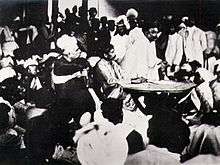Surat Split
Surat Split (1907) refers to the splitting of the Indian National Congress into 'Moderates' and 'Extremists' after a violent clash at the session.[1] The extremists were led by Lokmanya Tilak, Lajpat Rai, V. O. Chidambaram Pillai and Sri Aurobindo and the moderates were led by Gopal Krishna Gokhale, Pherozeshah Mehta and Surendranath Banerjee. [2] The divided Congress re-united in the crucial Lucknow session of congress in 1916.

Background
Moderates believed in the policy of settlement of minor issues with the government by deliberations. But the extremists believed in agitation, strikes and boycotts to force their demands. Some nationalists led by Lokmanya Tilak agitated against the moderate behaviour of congress against British rule. The split between these two sections became outward at the end of Banaras Session of congress (1905). Lokmanya Tilak and his followers held a separate conference and declared the formation of the Extremist Party.[3] However they decided to work as a part of the Indian National Congress. Difference between moderates and extremists further widened in Calcutta Session of congress (1906) and there were attempts between them to elect one of them as the president of congress. The moderates opposed the resolutions on Swaraj, Swadeshi, Boycott of foreign goods and National Education and requested to withdraw from the policy laid down in the Calcutta session. But the extremists were not ready to do so.[4]
In Surat Session (1907), extremists wanted Lala Lajpat Rai or Tilak as a President candidate of congress and Moderates supported Dr. Rashbihari Ghosh to be the President.[5] But Lala Lajpat Rai stepped down and Dr. Rashbihari Ghosh became the President. The British Government immediately launched a massive attack on the extremists and Extremist newspaper were suppressed. Lokmanya Tilak, their main leader, was sent to Mandalay jail for six years[6]
See also
revolutionaries
References
- ↑ "THE SURAT CONGRESS". Documents in the Life of Sri Aurobindo. Retrieved 24 August 2013.
- ↑ "Surat Congress Split". Sri Aurobindo's Political Life (1906-10). Retrieved 30 December 2015.
- ↑ "Surat Split 1907". ias.org.in. Retrieved 24 August 2013.
- ↑ "THE SURAT CONGRESS". Documents in the Life of Sri Aurobindo. Retrieved 24 August 2013.
- ↑ "Surat Session (1907)". Retrieved 24 August 2013.
- ↑ "Split in Congress - Part II". IndianSaga.com. Retrieved 24 August 2013.